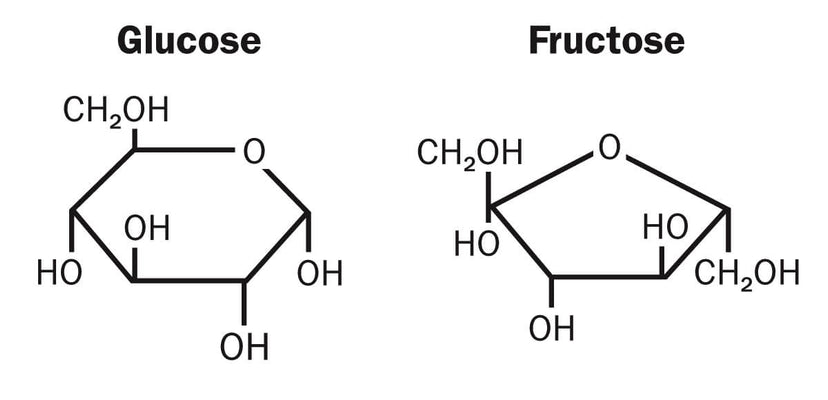Both fructose and glucose are essential parts of our everyday diet. They play an indispensable role in our energy metabolism. These two sugars have a lot of similarities, but their influence on our organisms differs by large.
Informing yourself about a healthy, balanced diet and healthy supplements, as well as getting to know all the possible risks of certain foods, is a good way to maintain your good health.
In the continuation of this text, you can find out how these two sugars are so similar but also so different, and why their uncontrollable consumption causes potential serious health problems.
Glucose
Glucose is a sugar found in our everyday foods. It Is very useful when some amount of energy is needed immediately. It is easily metabolized because of its linear composition. There are several reasons why glucose is very useful for our bodies.
First of all, it is easily absorbed because its structure is more simple for our bodies to metabolize. Also, the reserves of glucose, which is called glycogen, are very efficiently stored in our cells, waiting for future consumption.
Fruits, vegetables and cereals are some of the valuable sources of glucose. Also, starchy foods such as bread, pasta or potatoes contain large amounts of glucose. This diet provides large amounts of energy, easily available and metabolized when needed.

Glycogen - the storage of glucose
Except for the rapid energy production, glucose is a sugar, efficient in its storage. When our glucose intake is higher than currently needed, our bodies transform redundant glucose into glycogen.
By doing that, it provides additional energy for our bodies stored in our muscles and cells. It can be especially useful when food is not available or in times of intense activities.
Its availability is one of the reasons why athletes and others who need big amounts of energy to be timely consumed, find their solutions in foods rich in glucose.
Fructose
Fructose is a simple sugar, known as the “fruit sugar” due to its abundant presence in fruits. It can be found in different foods, but its most natural sources are fruits and honey.
Aldo is chemically structured the same as glucose, fructose is metabolized much more slowly. This is why it can cause some problems with the liver and even our hearts.
Fructose is not dangerous if taken regularly via a healthy, balanced diet, but modern foods full of processed foods contain unhealthy amounts of fructose, and its increased intake can cause some serious problems, especially for diabetics.

Influence of fructose in the body
Fructose is metabolized by the liver and small intestine. The liver is where the processing takes its place. The energy from fructose is produced by converting it into glucose or fatty acids. It can then be used as energy, or stored as fat for future needs.
Fructose, if taken in reasonable amounts, shouldn't cause any problems, and it can be an essential part of everyday useful and available energy source, however, if consumed in large amounts, especially via processed groceries, it can cause fatty liver disease.
After consuming unhealthy products full of sugars, we can develop insulin resistance, which is why we witness the epidemic of diabetes type 2 in modern society. Also, sugars, and especially fructose in highly processed foods, are common reasons for obesity and growing heart diseases in the modern world.
Conclusion
Both of these sugars are useful for our bodies as a source of energy for everyday activities. We can consume glucose via groceries such as bread, pasta etc. Fructose is most commonly found in fruits and vegetables.
The way sugar in processed foods influences our organisms is a serious problem. Small adjustments in our everyday diet, such as sugar-free supplements, and paying attention to our sugar intake, can make a huge difference in our health.
The problem with sugar consumption arises with the abundant production of modern, highly processed foods. This is where we have to be careful, and pay attention to our diet, making it diverse and balanced.


